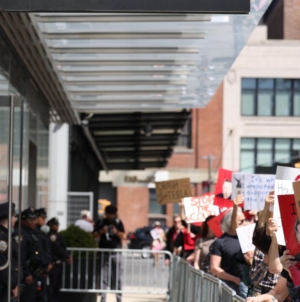-
How to Watch Kansas State vs USC: Live Stream Women’s NCAA Sweet 16, TV Channel - 12 mins ago
-
Iván Herrera & Lars Nootbaar drive in three-runs in 6th inning giving Cardinals a 4-1 lead vs. Twins - 46 mins ago
-
Kristi Noem’s Expenses Raise Eyebrows Among Republicans in Her Home State - 51 mins ago
-
Taliban releases American detained in Afghanistan - 54 mins ago
-
Photos: Hair goes flying at 22nd St. Baldrick’s fundraiser in L.A. - 59 mins ago
-
Ranking Randy Orton’s 10 Worst WWE WrestleMania Matches - 2 hours ago
-
2025 March Madness live updates, scores: Highlights from Elite Eight - 2 hours ago
-
Protesters rally against Elon Musk at Tesla showrooms over the continued U.S. government purge - 2 hours ago
-
‘Baywatch’ alum Alexandra Paul terrorized by stalker for 13 years - 2 hours ago
-
Minnesota Plane Crash: What We Know as Emergency Teams Respond - 2 hours ago
President Trump on Wednesday said he will put a 25% tariff on automobiles imported into the U.S., escalating his administration’s use of aggressive trade measures in an effort to boost domestic manufacturers.
After White House press secretary Karoline Leavitt said the tariffs would be detailed at a 4 p.m. EST by Mr. Trump, Wall Street shuddered, with the S&P 500 tumbling by 1.2% in late afternoon trading. Because tariffs are taxes on imports that are largely passed onto U.S. consumers, they can cause households to cut back on spending and dampen economic growth, according to experts.
“This will continue to spur growth like you haven’t seen before,” Mr. Trump said at a press conference Wednesday afternoon. “We’ll effectively be charging a 25% tariff. But if you build your car in the United States, there is no tariff.”
The latest salvo of tariffs comes after Mr. Trump earlier this month gave a one-month exemption to U.S. automakers from the round of import duties that took effect on March 4.
Shares of the Big Three U.S. automakers — Ford, General Motors and Stellantis — all sank after Mr. Trump announced the new tariffs.
Mr. Trump has long said that tariffs on auto imports would be a defining policy of his presidency, betting that the costs created by the taxes would lead both American and foreign automakers to relocate production to U.S. soil.
Automakers with U.S. plants still depend on Canada, Mexico and other nations for parts and finished vehicles. Because booting up manufacturing facilities would take time, in the medium term domestic auto prices would likely increase and car sales decline, experts say.
One analysis of Mr. Trump’s tariffs estimated that auto prices could rise as much as $12,200 for some models due to the new import duties, according to a report from Anderson Economic Group, a Michigan-based economic consultancy.
Kathryn Watson and
contributed to this report.































